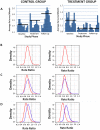Reduction of seizure occurrence from exposure to auditory stimulation in individuals with neurological handicaps: a randomized controlled trial
- PMID: 23071510
- PMCID: PMC3469625
- DOI: 10.1371/journal.pone.0045303
Reduction of seizure occurrence from exposure to auditory stimulation in individuals with neurological handicaps: a randomized controlled trial
Abstract
Background: The purpose of this work was to determine in a clinical trial the efficacy of reducing or preventing seizures in patients with neurological handicaps through sustained cortical activation evoked by passive exposure to a specific auditory stimulus (particular music). The specific type of stimulation had been determined in previous studies to evoke anti-epileptiform/anti-seizure brain activity.
Methods: The study was conducted at the Thad E. Saleeby Center in Harstville, South Carolina, which is a permanent residence for individuals with heterogeneous neurological impairments, many with epilepsy. We investigated the ability to reduce or prevent seizures in subjects through cortical stimulation from sustained passive nightly exposure to a specific auditory stimulus (music) in a three-year randomized controlled study. In year 1, baseline seizure rates were established. In year 2, subjects were randomly assigned to treatment and control groups. Treatment group subjects were exposed during sleeping hours to specific music at regular intervals. Control subjects received no music exposure and were maintained on regular anti-seizure medication. In year 3, music treatment was terminated and seizure rates followed. We found a significant treatment effect (p = 0.024) during the treatment phase persisting through the follow-up phase (p = 0.002). Subjects exposed to treatment exhibited a significant 24% decrease in seizures during the treatment phase, and a 33% decrease persisting through the follow-up phase. Twenty-four percent of treatment subjects exhibited a complete absence of seizures during treatment.
Conclusion/significance: Exposure to specific auditory stimuli (i.e. music) can significantly reduce seizures in subjects with a range of epilepsy and seizure types, in some cases achieving a complete cessation of seizures. These results are consistent with previous work showing reductions in epileptiform activity from particular music exposure and offers potential for achieving a non-invasive, non-pharmacologic treatment of epilepsy.
Trial registration: Clinicaltrials.gov NCT01459692.
Conflict of interest statement
Figures



Similar articles
-
Effects of music on seizure frequency in institutionalized subjects with severe/profound intellectual disability and drug-resistant epilepsy.Psychiatr Danub. 2017 Sep;29(Suppl 3):399-404. Psychiatr Danub. 2017. PMID: 28953798 Clinical Trial.
-
Lamotrigine adjunctive therapy among children and adolescents with primary generalized tonic-clonic seizures.Pediatrics. 2006 Aug;118(2):e371-8. doi: 10.1542/peds.2006-0148. Epub 2006 Jul 17. Pediatrics. 2006. PMID: 16847080 Clinical Trial.
-
Mozart K.448 listening decreased seizure recurrence and epileptiform discharges in children with first unprovoked seizures: a randomized controlled study.BMC Complement Altern Med. 2014 Jan 13;14:17. doi: 10.1186/1472-6882-14-17. BMC Complement Altern Med. 2014. PMID: 24410973 Free PMC article. Clinical Trial.
-
Carbamazepine versus phenytoin monotherapy for epilepsy: an individual participant data review.Cochrane Database Syst Rev. 2019 Jul 18;7(7):CD001911. doi: 10.1002/14651858.CD001911.pub4. Cochrane Database Syst Rev. 2019. PMID: 31318037 Free PMC article.
-
Topiramate versus carbamazepine monotherapy for epilepsy: an individual participant data review.Cochrane Database Syst Rev. 2019 Jun 24;6(6):CD012065. doi: 10.1002/14651858.CD012065.pub3. Cochrane Database Syst Rev. 2019. PMID: 31233229 Free PMC article.
Cited by
-
Daily listening to Mozart reduces seizures in individuals with epilepsy: A randomized control study.Epilepsia Open. 2020 May 27;5(2):285-294. doi: 10.1002/epi4.12400. eCollection 2020 Jun. Epilepsia Open. 2020. PMID: 32524054 Free PMC article.
-
Music-Enhanced Analgesia and Antiseizure Activities in Animal Models of Pain and Epilepsy: Toward Preclinical Studies Supporting Development of Digital Therapeutics and Their Combinations With Pharmaceutical Drugs.Front Neurol. 2019 Mar 27;10:277. doi: 10.3389/fneur.2019.00277. eCollection 2019. Front Neurol. 2019. PMID: 30972009 Free PMC article.
-
Analysis of the influence of memory content of auditory stimuli on the memory content of EEG signal.Oncotarget. 2016 Aug 30;7(35):56120-56128. doi: 10.18632/oncotarget.11234. Oncotarget. 2016. PMID: 27528219 Free PMC article.
-
Digital Therapeutics for Improving Effectiveness of Pharmaceutical Drugs and Biological Products: Preclinical and Clinical Studies Supporting Development of Drug + Digital Combination Therapies for Chronic Diseases.J Clin Med. 2024 Jan 11;13(2):403. doi: 10.3390/jcm13020403. J Clin Med. 2024. PMID: 38256537 Free PMC article. Review.
-
Mozart's or Ambient Music do not Affect Autoalgometric Pain Threshold.Transl Med UniSa. 2020 May 31;22:1-4. eCollection 2020 May. Transl Med UniSa. 2020. PMID: 32523899 Free PMC article.
References
-
- Schwartzkroin PA (1994) Cellular electrophysiology of human epilepsy. Epilepsy Res 17 (3) 185–192. - PubMed
-
- Timofeev I, Bashenov M (2005) Mechanisms of cortical trauma induced epileptogenesis and seizures. Neuron 661: 1–43.
-
- McCormick DA, Contreras D (2001) On the Cellular and Network Bases of Epileptic Seizures. Annu Rev Physiol 63: 815–846. - PubMed
-
- Green JB (1971) Reflex epilepsy. Epilepsia 12 (3) 225–234. - PubMed
-
- Ferlazzo E, Zifkin BG, Andermann E, Andermann F (2005) Cortical triggers in generalized reflex seizures and epilepsies. Brain 128 (4) 700–710. - PubMed
Publication types
MeSH terms
Substances
Associated data
LinkOut - more resources
Full Text Sources
Other Literature Sources
Medical

